Do you want to buy your child educational toys that will support their natural growth and promote active, self-directed learning? Take a look at Montessori toys!
The Montessori educational approach, created by Maria Montessori in the early 1900s, is predicated on the notion that children learn most effectively via experiential, self-directed learning. The purpose of Montessori toys is to support this teaching approach and to promote exploration and discovery.
In addition to giving kids the chance to learn and develop via play, Montessori toys also aid in the improvement of children’s fine motor, cognitive, and problem-solving abilities. Montessori toys are the ideal option for parents and carers wishing to include educational play into their child’s routine because of its basic, yet engaging and stimulating design.
In this blog post, we will explore the benefits of Montessori toys, the different types of Montessori toys available, and tips for choosing the right Montessori toy for your child.
We have designed the post in a topic based manner to ease the reading.
I. Introduction
- Definition of Montessori method and its principles
- Importance of hands-on, self-directed learning for children
II. Benefits of Montessori toys
- Support the Montessori method of teaching
- Encourage exploration and discovery
- Help develop fine motor skills, problem-solving skills, and cognitive skills
III. Types of Montessori toys
- Sensorial toys (e.g. shape sorters, puzzles, sound boxes)
- Practical life toys (e.g. toy kitchen, toy tools, toy laundry set)
- Language toys (e.g. alphabet blocks, picture cards)
- Mathematical toys (e.g. counting bears, numeral cards)
IV. Choosing the right Montessori toy
- Age-appropriate
- High-quality materials and construction
- Simple and open-ended
- Encourage hands-on learning
V. Conclusion
- Recap of the benefits of Montessori toys
- Encourage parents and caregivers to consider incorporating Montessori toys into their child’s playtime routine.
Let’s Start
I. Introduction
Definition of Montessori method and its principles:
The Montessori method is a philosophy of education that was developed by Maria Montessori in the early 1900s. It is based on the idea that children learn best through hands-on, self-directed learning experiences. The Montessori method emphasizes respect for the child’s natural development and the importance of allowing children to explore and discover the world around them.
Importance of hands-on, self-directed learning for children:
Hands-on, self-directed learning is important for children because it allows them to learn at their own pace and in their own way. It also helps them develop independence, confidence, and problem-solving skills.
II. Benefits of Montessori toys
- Support the Montessori method of teaching:
Montessori toys are specifically designed to support the Montessori method of teaching. They are simple, yet engaging and stimulating, and encourage children to learn through exploration and discovery.
- Encourage exploration and discovery:
Montessori toys are designed to be open-ended, meaning that they can be used in a variety of ways. This encourages children to be creative and to explore and discover new things about the world around them.
- Help develop fine motor skills, problem-solving skills, and cognitive skills:
Montessori toys are designed to be hands-on and interactive, which helps children develop their fine motor skills and hand-eye coordination. They also encourage children to think critically and to solve problems, which helps develop their cognitive skills.
-
Product on sale
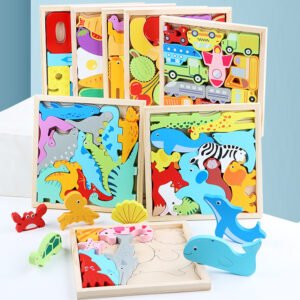 Wooden Puzzle 3D Jigsaw Toy- Nature and Learning (Pack of 3)Original price was: ₹ 1,485.₹ 975Current price is: ₹ 975.
Wooden Puzzle 3D Jigsaw Toy- Nature and Learning (Pack of 3)Original price was: ₹ 1,485.₹ 975Current price is: ₹ 975. -
Product on sale
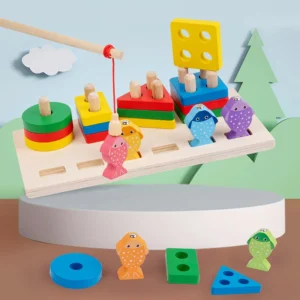 Wooden Shape Sorter & Fishing 2-in-1 Puzzle Game For KidsOriginal price was: ₹ 950.₹ 560Current price is: ₹ 560.
Wooden Shape Sorter & Fishing 2-in-1 Puzzle Game For KidsOriginal price was: ₹ 950.₹ 560Current price is: ₹ 560. -
Product on sale
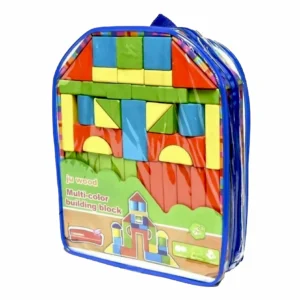 Wooden Building Blocks Set 40-Piece Multicolor Play KitOriginal price was: ₹ 1,000.₹ 485Current price is: ₹ 485.
Wooden Building Blocks Set 40-Piece Multicolor Play KitOriginal price was: ₹ 1,000.₹ 485Current price is: ₹ 485. -
Product on sale
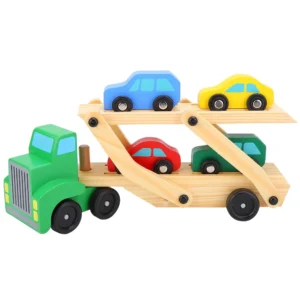 Wooden Double Deck Car Carrier Big Truck Toy(1 Truck, 4 Cars)Original price was: ₹ 2,000.₹ 1,099Current price is: ₹ 1,099.
Wooden Double Deck Car Carrier Big Truck Toy(1 Truck, 4 Cars)Original price was: ₹ 2,000.₹ 1,099Current price is: ₹ 1,099.
III. Types of Montessori toys
- Sensorial toys:
Sensorial toys are designed to help children develop their senses, such as sight, sound, touch, and taste. Examples of sensorial toys include shape sorters, puzzles, and sound boxes.
- Practical life toys:
Practical life toys are designed to help children learn practical skills that they will use in their daily lives. Examples of practical life toys include toy kitchens, toy tools, and toy laundry sets.
- Language toys:
Language toys are designed to help children learn language skills, such as reading, writing, and speaking. Examples of language toys include alphabet blocks, picture cards, and reading games.
- Mathematical toys:
Mathematical toys are designed to help children learn math skills, such as counting, addition, and subtraction. Examples of mathematical toys include counting bears, numeral cards, and math games.
IV. Choosing the right Montessori toy
- Age-appropriate:
It’s important to choose Montessori toys that are appropriate for your child’s age and developmental level. Toys that are too advanced may be frustrating for your child, while toys that are too easy may not be challenging enough.
- High-quality materials and construction:
Montessori toys should be made from high-quality materials that are durable and safe for children to play with. They should also be well-constructed and able to withstand regular use.
- Simple and open-ended:
Montessori toys should be simple and uncluttered, with few or no moving parts. They should also be open-ended, meaning that they can be used in a variety of ways, encouraging children to be creative and explore.
- Encourage hands-on learning:
Montessori toys should be hands-on and interactive, encouraging children to engage with the toy and learn through play.
V. Conclusion
In conclusion, Montessori toys are a great choice for parents and caregivers looking to support their child’s natural development and encourage hands-on, self-directed learning.
These educational toys provide children with the opportunity to learn and grow through play, helping to develop fine motor skills, problem-solving skills, and cognitive skills.
With their simple, yet engaging and stimulating design, Montessori toys are suitable for children of all ages and make a great addition to any playroom or classroom. When choosing a Montessori toy for your child, it’s important to consider their age and developmental level, as well as the quality of the materials and construction.
Overall, Montessori toys are a valuable resource for parents and educators looking to provide children with educational and enriching play experiences. Consider incorporating a few into your child’s playtime routine and watch as they learn, grow, and have fun.
Thank you for reading about the benefits and features of Montessori toys.
If you’re interested in incorporating these educational toys into your child’s playtime routine, be sure to visit our store to browse our selection.
Our team is dedicated to providing high-quality, safe, and engaging Montessori toys for children of all ages. We hope to see you soon!
-
Product on sale
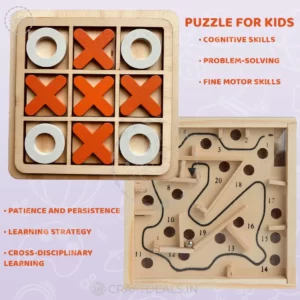 Wooden XOXO Puzzle and Maze Puzzle Board (Pack of 2)Original price was: ₹ 820.₹ 249Current price is: ₹ 249.
Wooden XOXO Puzzle and Maze Puzzle Board (Pack of 2)Original price was: ₹ 820.₹ 249Current price is: ₹ 249. -
Product on sale
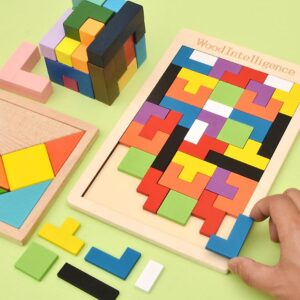 Wooden Tetris Russian Colorful Puzzle Board For Kids | Jigsaw Puzzle Multicolour – 40 PiecesOriginal price was: ₹ 632.₹ 339Current price is: ₹ 339.
Wooden Tetris Russian Colorful Puzzle Board For Kids | Jigsaw Puzzle Multicolour – 40 PiecesOriginal price was: ₹ 632.₹ 339Current price is: ₹ 339. -
Product on sale
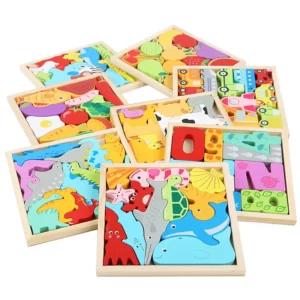 Wooden Puzzle Toy 3D Jigsaw Animal/ Fruit/Vegetable (1 set)Original price was: ₹ 851.₹ 365Current price is: ₹ 365.
Wooden Puzzle Toy 3D Jigsaw Animal/ Fruit/Vegetable (1 set)Original price was: ₹ 851.₹ 365Current price is: ₹ 365. -
 Wooden Indian Nesting Channapatna Dolls | Russian Nesting Dolls For Kids Hand painted (Set of 5)₹ 437
Wooden Indian Nesting Channapatna Dolls | Russian Nesting Dolls For Kids Hand painted (Set of 5)₹ 437 -
Product on sale
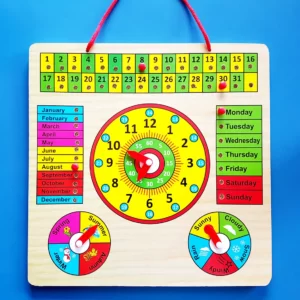 Wooden Calendar, Clock, Weather and Seasons Board for Kids LearningOriginal price was: ₹ 702.₹ 385Current price is: ₹ 385.
Wooden Calendar, Clock, Weather and Seasons Board for Kids LearningOriginal price was: ₹ 702.₹ 385Current price is: ₹ 385. -
Product on sale
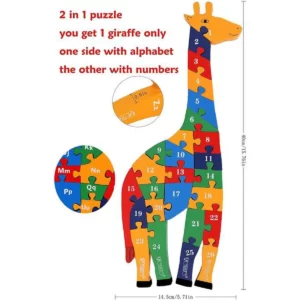 Wooden Giraffe Puzzle 3D | 26 Letter Alphabet and 123 NumberOriginal price was: ₹ 599.₹ 339Current price is: ₹ 339.
Wooden Giraffe Puzzle 3D | 26 Letter Alphabet and 123 NumberOriginal price was: ₹ 599.₹ 339Current price is: ₹ 339.



Pingback: What is the special about Channapatna toys? | Craftdeals.in